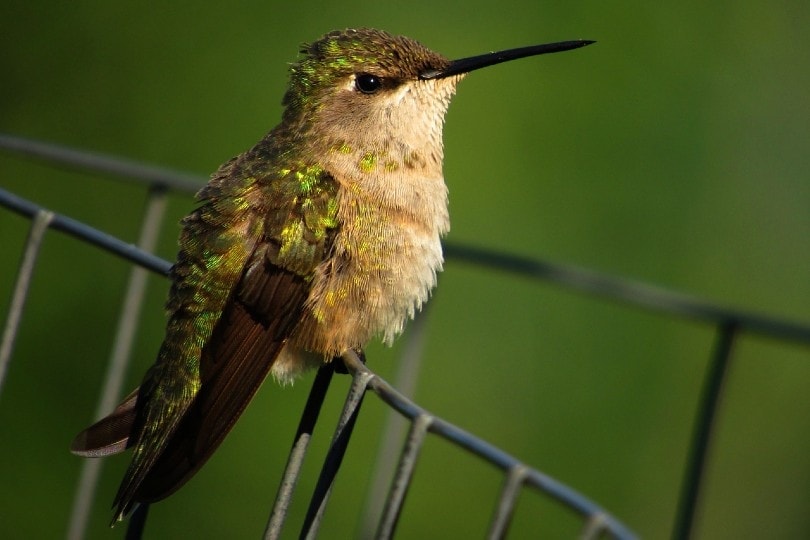Where Do Hummingbirds Sleep At Night?
Last Updated on

Although hummingbirds are mostly seen scurrying around your feeder, they have to sleep at some point. During the nighttime, hummingbirds find small twigs protected from the wind so that they can sleep safely and soundly in a state of torpor.
To learn more about where hummingbirds sleep at night and what torpor entails, keep reading.

Where Do Hummingbirds Go At Night?
At night, hummingbirds find a place to sleep. Most often, hummingbirds will sleep in a nest or on a twig that is protected from the wind. They look for spots deep in the branches and leaves so that they are kept warm and protected from the weather.
When sleeping, hummingbirds cling to their branch and fluff their feathers out. This approach to sleeping position keeps the bird in place while it sleeps and keeps the bird warm by retaining as much body heat as possible.
Twigs and branches are the ideal location for hummingbirds. Although hummingbirds will sleep in a nest during mating season, you won’t find hummingbirds sleeping in a nest if they can avoid it or don’t have little chicks.

Exceptions
Sometimes, hummingbirds will go somewhere else during the night. For example, some hummingbirds will continue eating late into the night if there is a lot of unnatural lighting. Hummingbirds have terrible eyesight, which means that most hummingbirds must sleep during the night. In cities, for example, hummingbirds are likely to stay up late due to the light pollution.
Hummingbirds continue flying through the night during the migration period as well. Ruby Throated Hummingbird’s are an example of this. Whenever they need to cross the Mexican Gulf, the hummingbirds will continue flying until they’ve reached their destination, which can take up to 20 hours to finish.
Often while migrating, hummingbirds will fly close to the water during the night so that they know they are flying in a straight line. As soon as they reach their destination, hummingbirds take a much-needed nap, after eating of course!
Do Hummingbirds Sleep?
Just like every other animal, hummingbirds need to sleep. Although it may be difficult to picture these rapid moving birds at rest, hummingbirds sleep every night and need a lot of sleep at that. Because hummingbirds burn off so much energy during the day, these birds sleep in a torpor state, which is almost like a mini hibernation.

Hummingbird Torpor
Unlike other animals, hummingbirds are almost constantly moving when awake. As a result, these birds need a lot of rest to maintain a healthy life. Because of their small size, hummingbirds can’t just sleep like you or me. Instead, they need to sleep in what is called a torpor.
Torpor Explained
A torpor is a mini coma or hibernation that allows the hummingbird to conserve as much energy as possible while sleeping. In many ways, torpor is similar to a bear hibernating. The main difference is that torpor is not seasonal and only lasts through the night.
During the state of torpor, hummingbirds can slow their metabolism, heartbeat, etc. This slowing of the bird’s natural functions helps the hummingbird conserve between 60% and 90% of their energy when sleeping. Talk about a peaceful night’s rest!
Another benefit of the torpor state is that it allows the hummingbird to survive cold nights. With a lowered metabolism, the bird can survive much harsher temperatures when asleep than it can when awake.
Because of how relaxing the torpor state is, some hummingbirds will look dead when they sleep. This is especially true if the bird begins to fall and ends up dangling off its twig or perch. If you see a hummingbird in this position, don’t touch it. It is likely sleeping.

How Hummingbirds Wake Up From Torpor
Watching a hummingbird wake up is an amusing sight. Because of its nightly hibernation, it can take hummingbirds between 20 minutes and one hour to awake. The process begins with the hummingbird breathing in more oxygen. The hummingbird almost sounds like its snoring during this time.
Whenever the hummingbird starts breathing normally again, the bird often starts to shiver. These shivering motions don’t mean that the bird is cold. Instead, it helps to distribute the bird’s blood to a more consistent and warming flow. Once fully awake, the bird will fly off to eat.

Conclusion
Every night, hummingbirds put themselves in a state of torpor to fully relax from the day and fuel up for the next. During this torpor period, you are most likely going to catch the hummingbird nestled deep into branches to help shield the bird from any inclement weather that may develop overnight.
If you live in a city, hummingbirds may stay active later into the night, but they will eventually find a place to sleep too, whether it be in trees or somewhere else. The only times hummingbirds do not sleep at night is when they are crossing bodies of water during migration, but this is rare and only lasts a day.
The reason that hummingbirds need this insane amount of sleep is because of how active they are during the day. Since these birds flap their wings on average 54 times a second, it’s no shock that they need some intense beauty sleep on a nightly basis!
Featured Image Credit: Diana Roberts, Pixabay
About the Author Robert Sparks
Robert’s obsession with all things optical started early in life, when his optician father would bring home prototypes for Robert to play with. Nowadays, Robert is dedicated to helping others find the right optics for their needs. His hobbies include astronomy, astrophysics, and model building. Originally from Newark, NJ, he resides in Santa Fe, New Mexico, where the nighttime skies are filled with glittering stars.
Related Articles:
10 Types of Hummingbirds in Arkansas (With Pictures)
8 Types of Hummingbirds in Nebraska (With Pictures)
5 Types of Hummingbirds in Idaho (With Pictures)
3 Types of Hummingbirds in Mississippi (With Pictures)
8 Types of Hummingbirds in Kansas (With Pictures)
5 Types of Hummingbirds in West Virginia (With Pictures)
5 Types of Hummingbirds in Ohio (With Pictures)
Where Do Nuthatches Nest? Nuthatch Nesting Habits Explained
